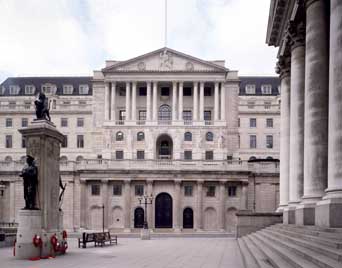The Bank of England (BofE) has launched the latest phase of its system-wide exploratory scenario (SWES) exercise, providing both bank and non-bank participants with a hypothetical stress scenario.
The Bank initially launched the SWES in June, in an effort to better understand the behaviours of banks and non-bank financial institutions (NBFI) in stressed financial market conditions, and how these behaviours and market dynamics can amplify shocks in markets and potentially pose risks to UK financial stability.
In the latest phase of the SWES, participants have been supplied with the details of a severe, but plausible, stress scenario.
The scenario was designed to be faster, wider ranging, and more persistent than those seen in recent periods of market instability, such as the September/October 2022 liability-driven investment (LDI) episode, and includes a ten-day shock to rates and risky asset prices.
The shocks in the scenario also incorporate many elements from recent market events, such as a sharp increase in UK government borrowing costs as yields on ten- year nominal gilts increase by 115 basis points, similar to the move seen during the LDI episode.
In addition to this, it includes a sharp increase in sterling investment-grade corporate borrowing costs, as much as seen during the March 2020 dash for cash.
However, the combination of the individual shocks, the fact that the majority of the market moves take place in the first three days of the exercise, and the persistence of the shock, mean that the hypothetical stressed scenario is considered more severe than those seen in historical episodes.
Participating firms include large banks, insurers, central counterparties and a variety of funds, including pension funds, hedge funds, and funds managed by asset managers, as reflection of the wide range of institutions engaged in UK financial markets.
The Bank is also working closely with the Financial Conduct Authority and The Pensions Regulator.
The exercise aims to improve understanding of how banks and non-banks behave in stressed conditions, with participants asked to consider the impact of this hypothetical stress scenario, including how it would impact their business, and what actions they would take in response.
The second round of the scenario phase, which will reflect the actions that the participants take in the first round, will be launched in Q2 2024, with a final report on the SWES set to be published by the end of 2024.
Latest News
-
Govt urged to prioritise pension policy stability in Spring Statement
-
Just Group underlying operating profit falls by 39%
-
Employers warned modest pension defaults risk worsening adequacy gap
-
Aegon updates modelling tool to help members benchmark retirement needs
-
News in brief - 27 February 2026
-
PPF levy to remain at zero for 2026/27
Private markets – a growing presence within UK DC
Laura Blows discusses the role of private market investment within DC schemes with Aviva Director of Investments, Maiyuresh Rajah
The DB pension landscape
Pensions Age speaks to BlackRock managing director and head of its DB relationship management team, Andrew Reid, about the DB pensions landscape
Podcast: From pension pot to flexible income for life

Podcast: Who matters most in pensions?

In the latest Pensions Age podcast, Francesca Fabrizi speaks to Capita Pension Solutions global practice leader & chief revenue officer, Stuart Heatley, about who matters most in pensions and how to best meet their needs
© 2019 Perspective Publishing Privacy & Cookies











Recent Stories